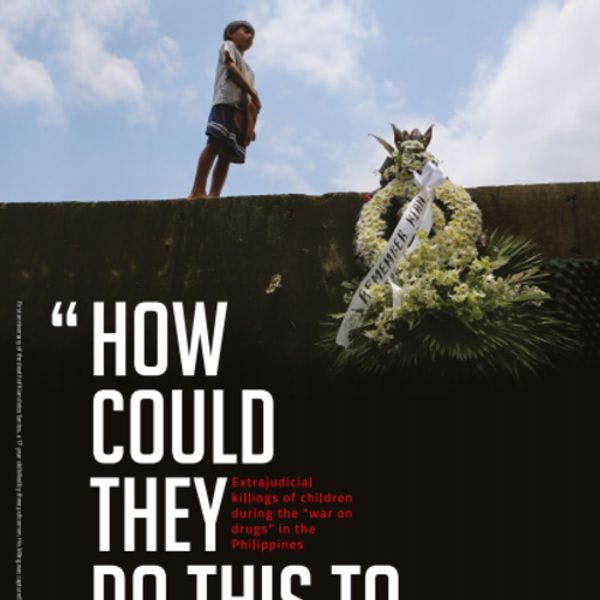« Comment ont-ils pu faire ça à mon enfant ? » - Exécutions extrajudiciaires d'enfants pendant la « guerre contre la drogue » aux Philippines
Ces 122 meurtres sont l'expression la plus obscène et la plus tragique d'une tendance plus large à l'érosion des droits des enfants dans le cadre de la "guerre contre la drogue" menée par le gouvernement. Pour en savoir plus, en anglais, veuillez lire les informations ci-dessous.
By World Organisation Against Torture (OMCT) and the Children’s Legal Rights and Development Center (CLRDC, Philippines)
The extrajudicial killings that are the hallmark of the Philippines’ “war on drugs” have not spared children, a fact that remains underreported. This report documents 122 killings of children, aged from 1 to 17 years old, between July 2016 and December 2019, throughout the country. This number is a minimum: with parents and relatives often too afraid of reprisals to report or testify, it is likely that the actual figures are higher.
Far from being only “collateral damage”, as callously stated by President Rodrigo Duterte, these have often been deliberate killings. Our investigations show that 38.5% were carried out by policemen as port of police operations, while 61.5% were executed by unknown individuals, often masked or hooded assailants, some of them with direct links to the police.
Child victims were killed in different circumstances and manners. Our research identifies four clear patterns, with children being:
- direct targets (most of the time with the alleged justification of “self-defense”, or the deliberate elimination of a child witness of another killing)
- killed as proxies when the real targets could not be found
- killed as a result of mistaken identities
- so-called “collateral damage”, losing their lives to stray bullets during police operations.
An analysis of the 122 cases further shows similar narratives, with planting of evidence on the scene of the killings, uncorroborated allegations by security forces that they acted in self-defense and killing operations that were based on false and unverified information. This report provides detailed accounts of six such killings.
Only one of these crimes was genuinely investigated, prosecuted and led to a conviction, because it had been recorded on video. No other perpetrator has been genuinely investigated and prosecuted, and the killings continue, with at least another seven children losing their lives since the beginning of 2020.
The total impunity enjoyed by the perpetrators is further reinforced by the climate of terror created by the “war on drugs”, a campaign that has targeted the poorest sectors of the population. Families of the victims, as well as other witnesses, are silenced by direct threats and fear of retaliation if they were to file a case for the killing of their child. As a result, the authorities have a free hand to close cases.
The killings are only the most shocking manifestation of what appears as a much wider war on children in the country, with an array of measures and revised legislation that try to criminalize children in relation to drug-related issues. Examples are attempts to lower the minimum age of criminal responsibility to 12 or even 9 years old, and the introduction of mandatory drug testing in high school. The murders described in this report take place against a background of progressive erosion of a once protective children’s rights legal framework.
The “war on drugs” has also prompted a sharp increase in the arrest and detention of children based on drug-related charges, leading to the overcrowding of detention centres where abuse, ill-treatment and even torture are rife. This increasingly brutal policy has spilled over during the recent Covid-19 related lockdown, with numerous children arrested for curfew violations, sometimes threatened with being shot and detained in dog cages or inside a coffin.
While 122 killings represent only a small fraction of the total number of estimated violent deaths during the “war on drugs”, which may run as high as 27,000, they are particularly serious due to the heightened vulnerability of children and their specific status under international law. States have a particular responsibility to guarantee and promote children’s rights, and a specific duty to investigate and ensure accountability for the violations of such rights. This includes the Philippines, who is a party to the Convention on the Rights of the Child.
The OMCT calls on the government of the Philippines to urgently put an end to extrajudicial killings and other gross violations of the rights of children, carry out prompt investigations into these crimes, and sanction the perpetrators. The United Nations Human Rights Council should establish an independent Commission of Inquiry into allegations of gross human rights violations, especially those of children, 5 in the context of the “war on drugs”. The International Criminal Court should expedite its examination and conduct investigations on possible crimes committed by the Philippines. Finally, the OMCT calls on the European Union, its member States and other States to take the situation of children into account when negotiating trade agreements and other conventions with the Philippines.
